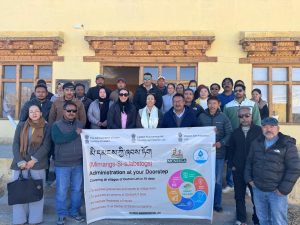Mimangs-Si-Sjabstogs: Administration at Your Doorstep conducted at Chuchot Shamma.

Mimangs-Si-Sjabstogs: Administration at Your Doorstep conducted at Chuchot Shamma.
Leh, November 12–The outreach campaign “Mimangs-Si-Sjabstogs “Administration at Your Doorstep” was hosted today at the community hall in Chuchot Shamma, bringing multiple departments directly into the community.
Nodal Officer Deldan Angmo extended a warm welcome to department officials and village residents who actively participated in the event.
The camp featured participation from the Agriculture, Animal & Sheep Husbandry, Health (PHC Chuchot), Agriculture & Horticulture, Education, Cooperatives, Social Welfare department, Soil Conservation, RDD, PDD and PHE departments, with around 15 departmental representatives and 100 villagers present.
CEO Leh, Deldan Angmo, elaborated on various initiatives being implemented under the Samagra Shiksha scheme, including Bal Vatikas, NEP implementation, school upgradation, and the provision of free textbooks and uniforms. She also highlighted the potential to establish Atal Tinkering Labs under innovation components of the scheme. Further, she assured that, based on the enrolment strength at Alchirong School, it would be considered for upgradation into a model school. She also mentioned the PM SHRI scheme, and the details of its objectives and implementation were explained during the session.
Chuchot Shamma Nambardar Manzoor Hussain thanked the administration for this initiative, noting that it enhances awareness and requested a hostel facility for the higher secondary school in Chuchot Shamma.
In the sheep and animal-husbandry segment, officials briefed villagers on schemes including NADCP, artificial insemination, and the KCC loan (not requiring collateral), as well as the importance of mineral mixtures and salt for livestock health.
The agriculture department described scheme details and practical solutions for daily challenges such as infestation and greenhouse management, explained the PDMC CSS scheme use, and introduced agro-forestry and vermicompost training for women farmers. They noted grievances regarding need for more field-workers and heavy rainfall damage to farms, which will be addressed.
Horticulture officials highlighted fruit-sapling distribution, plantation schemes supporting Rs 68,000 per canal, and subsidies for tubular greenhouses with galvanized metal. They also pledged training for villagers. The Nambardar provided ground-level issues, which were duly noted by officials.
The Social Welfare Department informed about marriage-certificate registration, pending scholarships (urging filing of forms), and eligibility criteria for various schemes. Fisheries representatives outlined the flagship Pradhan Mantri Matsya Sampada Yojana (PMMSY), noting 60 % funding by the government for eligible beneficiaries.
In the health segment, villagers received on-the-spot testing for sugar and blood pressure, and registrations for Golden Card, ABHA ID and Ayushman Cards; subsidies were also explained.
The Rural Development department urged grassroots engagement through job-cards under Mahatma Gandhi National Rural Employment Guarantee Act (MGNREGA), and other infrastructure components such as boundary-walls, canals, footpaths and waste-management. The procedure and benefits of Pradhan Mantri Awas Yojana (PMAY) were also discussed.
The Cooperative and Revenue departments addressed land issues and cooperative models for consumer goods and self-reliant groups. The Soil Conservation office discussed soil surveys and fencing subsidies. PDD talked through the Ladakh Bijli Act, online payments, smart-meter issues and the replacement of wooden poles; the PHE department listened to village-level water issues and pledged action.


